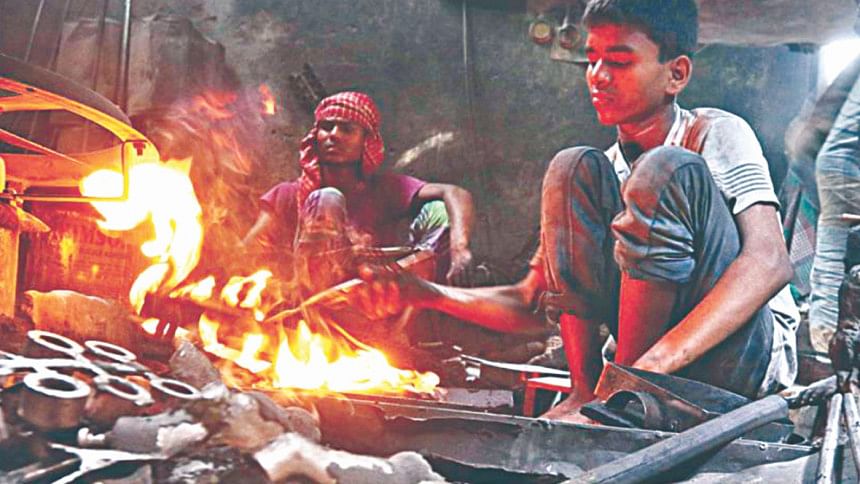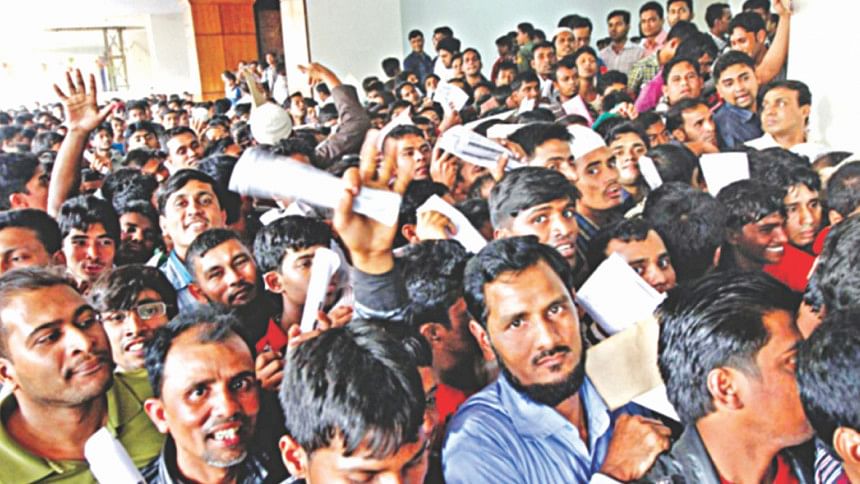State of workers' welfare

For a relatively new country, Bangladesh has made some remarkable developmental achievements. There has been great progress towards the Millennium Development Goals, particularly in reducing child mortality and halving poverty. It is an experience on which other countries will no doubt draw.
Likewise, Bangladesh has enjoyed strong economic growth since the 2000s, consistently greater than six percent and in excess of that achieved by other developing countries. Much of this growth has been driven by the emergence of the ready made garments (RMG) sector, which in the space of just a few short decades has expanded from a handful of factories to the world's second largest garment exporter.
While Bangladesh's progress has been considerable, and is internationally recognised, there have been difficult moments too and challenges have emerged. It has been through a shared commitment to overcome those challenges that the relationship between Bangladesh and the International Labour Organisation (ILO) has grown and deepened. In close collaboration with its tripartite constituents—the government, employers, and workers' organisations—ILO has not hesitated to tackle difficult questions. And we have done so because we are concerned that they are crucial to the sustained development and prosperity of the country.
The need for inclusive growth
One such challenge is the size of the informal sector. Of the 60.7 million strong workforce in Bangladesh, 87.4 percent work in the informal economy, according to the 2013 Labour Force Survey. There is a strong need to take care of these workers and provide them with guarantees. If a rickshaw puller or tea seller does not work for a day, they do not get paid. If they are sick and in bed for a week, the whole family may go without food.
These people need assured incomes and social protection in case of unemployment, injury, or ill health. This is largely lacking for own-account workers who are earning on a day-to-day basis, and as a result, are left vulnerable. Unless the issues of this significant segment of the population are addressed, inclusive growth will be a distant dream for a large number of Bangladeshis. They must be brought into the fold for an equitable distribution of the income and prosperity of the nation. Growth that benefits only a few and undermines or excludes the many is a recipe for instability.
The government of Bangladesh has been proactive in addressing this risk in terms of reaching Vision 2021 and was amongst the first countries to promote the implementation of the 2030 Agenda for Sustainable Development. A number of the Sustainable Development Goals (SDGs) are fundamental in this regard. In particular, SDG 8, which is directed at promoting inclusive and sustainable economic growth, employment and decent work for all.
The expansion of its manufacturing base, which Bangladesh has pursed with determination as part of Vision 2021 and the 7th Five Year Plan, has resulted in large-scale employment, mostly in the formal sector. The ongoing shift from agriculture to manufacturing and services continues, and there now are some four million workers employed in the RMG sector alone. For many women, who make up over half of the RMG workforce, a job in this sector offers a way out of poverty and an escape route from early marriage.
Yet, while the RMG sector has created millions of jobs in a short space of time, this rapid growth has not always been matched by similar improvements in working conditions and labour rights. For many seeking a route out of poverty, any job is often a lifeline they will grasp. This needs to change. While applauding Bangladeshi employers for creating millions of these jobs, our efforts should be to create not just any jobs, but decent jobs. Decent jobs that offer decent incomes, provide safe workplaces, ensure dignity, and guarantee rights at workplace. This is what makes societies inclusive and prosper as well as sustains growth.
Workplace safety a priority
Events such as the Tazreen fire and Rana Plaza collapse revealed the precarious conditions many workers are in. While in the last few years, things have started to change, there is still little culture of safety and health in Bangladesh. The rapid growth of the manufacturing sector was not matched by similar development of regulatory bodies, while little technical capacity and understanding exists on how to manage safety and health at the enterprise level.
Good work has taken place since Rana Plaza to build safety in the RMG sector. Efforts are underway, supported by ILO, to reinforce the capacity of workers, supervisors and managers in the sector to improve the safety of their workplaces. Programmes like the ILO/IFC Better Work Initiative are also working with RMG factories to enhance safety and compliance while at the same time boosting productivity.
These efforts, however, need to extend beyond the RMG industry. The Tampaco fire reminded everyone that there is no room for complacency. The culture of occupational safety and health needs to penetrate deep into all sectors of the economy to ensure safe and decent workplaces for every person employed. Investments in all workplaces, export-oriented or otherwise, should be an integral strategy for Bangladesh to both grow economically as well as to ensure the welfare of workers.

The challenge of labour rights
The second dimension is respect for labour rights. While good progress has been made in recent years to boost safety, driving similar improvements in labour rights has proven more challenging.
Efforts are needed to help workers, managers, and owners alike, better understand their rights and obligations relating to the Bangladesh Labour Act and international labour standards. Bangladesh has ratified seven out of the eight ILO core conventions, including conventions 87 and 98 on Freedom of Association and Collective Bargaining. ILO supervisory bodies—the Committee of Experts on Application of Conventions and Recommendations and the Committee on Application of Standards—have made a number of recommendations to amend the Bangladesh Labour Act to bring it in compliance with international labour standards. Further amendments are therefore needed to Bangladesh's labour-related legal framework in consultation with the employers and workers' organisations towards ensuring compliance with ILO Conventions.
In addition, workers must also be allowed to fully enjoy their rights, especially with regards to freedom of association and collective bargaining. Trade union membership in Bangladesh is low and there remains a widespread distrust between employers and workers' organisations. Such negative perceptions pose barriers to the formation of new unions and for existing labour unions to operate effectively. Better understanding of the positive role workers' organisations can play will help in this regard.
Revisions to the Bangladesh Labour Act and subsequent developments resulted in the formation of some new RMG unions through 2013 and 2014. Since 2015, the rate has slowed markedly and workers' organisations have complained of several challenges during the process of registration. It is therefore vital to ensure that the trade union registration process is carried out as a smooth and expeditious formality, in accordance with objective and transparent criteria.
Further efforts are needed to ensure that alleged anti-union discrimination and unfair labour practices are investigated and, if necessary, prosecuted in a timely and transparent manner. For this reason, it is important that the Directorate of Labour has the necessary staff and resources to carry out its role effectively. The proposed upgradation of the Directorate into a full-fledged department with additional staff is a step in the right direction and swift action is needed to complete this reform.
Necessary legislative changes should also be made to the legal framework applicable in the Export Processing Zones (EPZs) to guarantee freedom of association and collective bargaining rights to workers and to ensure that such rights are commensurate with those provided in the national Labour Law and international labour standards.
The need for social dialogue
The recent and sudden unrest in RMG factories in the Ashulia area highlighted the need for effective consultation and dialogue mechanisms between workers and employers.
ILO Director General Guy Ryder, during his visit to Bangladesh in December 2016, picked up on this when he said, "My impression is that there is not the level of confidence and trust between employers and workers that is needed to ensure good working conditions and to ensure factories are productive and successful. Productive industrial relations is one of the keys to successful development."
The strengthening of social dialogue between government, employers and workers is a major priority. Social dialogue has many benefits. It provides a tool to build trust and inclusion, and to reduce the risk of social unrest. From a business perspective, the benefits of social dialogue in the workplace include increased productivity, reduced risk of disruption to business operations, and last, but not least, more committed workers. Social dialogue also benefits workers, by providing them with a say in the decision making process and a chance to express their concerns, organise and participate in the decisions affecting their lives.
A recently launched ILO project funded by Sweden and Denmark will seek to promote social dialogue and industrial relations in the RMG sector. With its focus on strengthening social dialogue and constructive dispute resolution, this project provides a defining opportunity to take Bangladesh's social and economic transformation to the next level based on the solid principles of partnership and inclusion.
It also has the potential to spark a multiplier effect, with its success benefiting other, nascent and expanding sectors. And if these workers can also be supported in achieving their fundamental workplace rights, there will be a basis for a truly inclusive, equitable, and stable society.
Social protection underpins worker welfare
Social protection is another major dimension relating to worker welfare. Providing basic guarantees of income replacement and compensation to workers in case of injury, sickness or unemployment is an important pillar of decent work.
ILO actively promotes policies and provides assistance to countries to help extend adequate levels of social protection to all members of society. The experience of setting up a mechanism to deliver compensation in the aftermath of the Rana Plaza highlighted the need for a universal and compulsory national Employment Injury Protection and Rehabilitation scheme to be established.
ILO is working closely with the government of Bangladesh and Germany to establish such a scheme. This would provide treatment or compensation in the event of a workplace accident or illness. An inclusive society that is heading towards middle income status needs to provide such minimum guarantees, and it is the right time for Bangladesh to be actively pursuing this area of work.
Workplace inclusivity and skills
Greater efforts also need to be made to create more inclusivity in the workforce. For example, Bangladesh continues to have a lower proportion of women in the labour market compared to global averages. Certain industries, such as RMG, have created huge opportunities for women, who make up the majority of staff. They can also help drive forward the economy of Bangladesh in many other areas, if only they too are given the chance. By failing to do so, Bangladesh will seriously hamper its potential to develop further on both the economic and social fronts.
The welfare of workers is very much linked to their ability to find decent work. Where will we find two million jobs for young people entering the labour market in Bangladesh every year? Opportunities are needed to help both young women and men to find jobs in new sectors, and for this reason, skills development is critical.
To escape the "low skills, low productivity" trap, the government of Bangladesh, with the support of ILO and a number of development partners, is on the right track by prioritising skills development and undertaking a series of measures to improve the national skills system. Skills reform has focussed on the national skills policy and strategies for inclusion as well as improved legislative, institutional, and financial capacities to sustain a robust skills system for Bangladesh. Providing skills demanded by the market is the key. Employers and their organisations have to be part of the decision making process to decide what skills should be imparted by the skills training institutions to bridge the gap between supply and demand for skills. Technical schools and colleges should run vocational training programmes in full partnership with the industry. Market forecasts within both Bangladesh and outside are critical steps to develop skills of young workers.
These efforts are vital to help Bangladeshis capture higher level jobs in all segments of the economy. In certain industries, many supervisory or management jobs are held by expats. Support and opportunities need to be provided for young men and women in Bangladesh to prepare to assume those roles through proper skills development and serve the needs of the industry.
Skilled and safe migration
The issue of skills is also closely linked to that of migration. Last year, some 750,000 workers migrated from Bangladesh, the vast majority of who were low skilled or unskilled. Better skills lead to higher salaries and better lives. This will benefit migrants, their families, local communities and the nation. Substantial research efforts are needed to determine the job needs of destination countries and to develop a credible and dynamic labour market information system upon which informed decisions can be made. Prospective migrants need skills training to match labour market demand and the government should be able to negotiate government-to-government agreements so that skilled workers are sent on a needs basis. The goal should be for safe, skilled and fair migration. Costs of migration should be reduced. This will have a huge impact on remittances, as well as the quality of life and welfare of many millions of migrants and their families.
Looking to the future
Bangladesh has made great progress in many areas as it strives to reach middle income status. While many challenges still remain, ILO is committed to support the government, employers, and workers alike, so that each and every Bangladeshi can share in the country's growth and that decent work can be achieved for all.
The writer is Country Director of ILO Bangladesh.

 For all latest news, follow The Daily Star's Google News channel.
For all latest news, follow The Daily Star's Google News channel. 



Comments